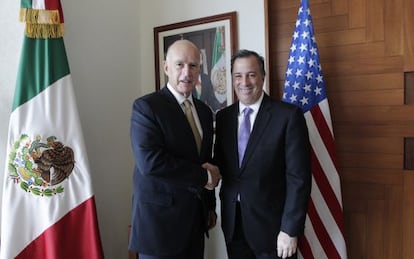“When we are talking about children, the use of military force is never justifiable”
Mexico’s foreign minister and California’s governor address the US-Mexican border crisis


Working under the banner of shared responsibility, Mexico and California want to turn the border into a competitive and prosperous region. Mexican Foreign Minister José Antonio Meade said the arrival of 60,000 unaccompanied Central American migrant children at the United States’ southern frontier requires that “the humanitarian aspect should be the guiding principle of all actions on both sides.” This week, California Governor Edmund G. Brown Jr. began a tour of Mexico to address the crisis that has overwhelmed the Barack Obama administration over the last few months. Brown will meet with President Enrique Peña Nieto and sign agreements on trade, environment and higher education.
“When we are talking about children, the use of military force is never justifiable,” Foreign Minister Meade said. “Police presence at the border only makes sense if it is to provide medical assistance and transportation support. Mexico and California agree on that more than ever.”
When asked about Mexico’s absence from a recent meeting Obama held with the presidents of El Salvador, Guatemala and Honduras, the foreign minister said Mexico had its own communication channels with the United States. “There has been a sustained and coordinated dialogue on the issue of migrant minors, including constant and direct communication between the heads of state [Obama and Peña Nieto]. Before the meetings with the Central American leaders, the United States and Mexico updated each other on the strategies that both countries are following with respect to this challenge, and Obama took the opportunity to thank Mexico for its cooperation and coordination. But Mexico has its own communication channels with Central America and other means of dialogue with the American government.”
In the long run, Congress and the president will have to change the law”
According to the minister, a defining characteristic of Mexico’s migrant population is its desire to reunite with relatives. “This means that immigrants do not usually want to remain in the country.” Meade also said the Mexican government held an event last week “to boost responsiveness in consular affairs offices in Central America and in Mexico in order to offer better assistance to the immigrants.” But they have received few refugee applications, he said.
Brown said that the number of migrants in the area – 11 million Mexicans live in California – means that the wellbeing of the region depends on how well those arriving from Central America and Mexico fare. “We are going to facilitate the flow of persons at the border,” he proposed. “The way forward is greater integration at an accelerated pace.” To meet this goal, the state helps undocumented migrants gain access to basic education. “The state extends many forms of protections to those who are undocumented. We can do a lot in that way. But in the long run, Congress and the president will have to change the law.”
“This migration phenomenon is complex and we need to address its multiple dimensions based on a principle of shared responsibility,” Meade began. “A unified American state implies shared values and the lack of immigration reform, which leaves millions of people undocumented and in limbo, undermines that ideal.”
The new law and a budget request for $3.7 billion to manage the crisis at the border are sitting on Capitol Hill. Republicans are demanding tough conditions before giving their approval.
Mexico and California share a 225-kilometer-long border. It is one of the most dynamic regions in the world. More than 30 million people cross over between Tijuana and San Ysidro every year. This area’s annual business transactions are worth $60 billion and cover numerous industries, including agriculture, fishing, medical equipment, technology and automobiles, among others. California will be the first state to sign a memorandum of understanding with Mexico to promote education.
Translation: Dyane Jean François
Tu suscripción se está usando en otro dispositivo
¿Quieres añadir otro usuario a tu suscripción?
Si continúas leyendo en este dispositivo, no se podrá leer en el otro.
FlechaTu suscripción se está usando en otro dispositivo y solo puedes acceder a EL PAÍS desde un dispositivo a la vez.
Si quieres compartir tu cuenta, cambia tu suscripción a la modalidad Premium, así podrás añadir otro usuario. Cada uno accederá con su propia cuenta de email, lo que os permitirá personalizar vuestra experiencia en EL PAÍS.
¿Tienes una suscripción de empresa? Accede aquí para contratar más cuentas.
En el caso de no saber quién está usando tu cuenta, te recomendamos cambiar tu contraseña aquí.
Si decides continuar compartiendo tu cuenta, este mensaje se mostrará en tu dispositivo y en el de la otra persona que está usando tu cuenta de forma indefinida, afectando a tu experiencia de lectura. Puedes consultar aquí los términos y condiciones de la suscripción digital.








































